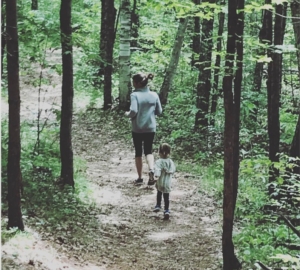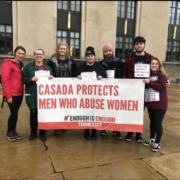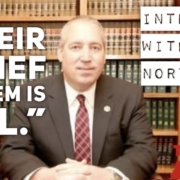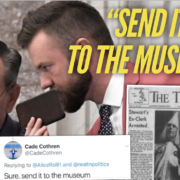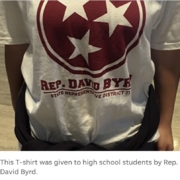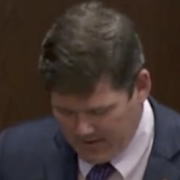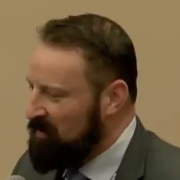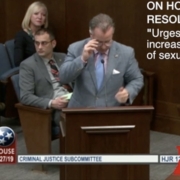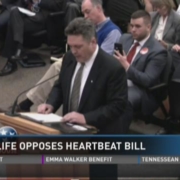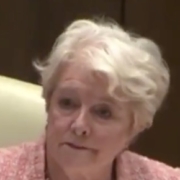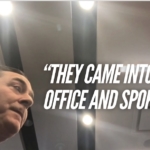Emily Tseffos is a mom, a teacher, a volunteer and community organizer with Enough is Enough Tennessee… and a survivor. She wrote this in response to a video we posted yesterday, where Speaker Glen Casada defended his support for admitted sex offender Rep. David Byrd, who he has now made chair of an education subcommittee while attacking Byrd’s victims and questioning why they didn’t come forward sooner.
This piece, of course, is purely hypothetical, and not at all about the allegations leveled against Rep. “Coach” David Byrd by 3 of his former players.
——
Imagine this. You’re fifteen years old and live in a small town, about an hour off of Interstate 40 in southwest Tennessee. It’s literally a one-stoplight town, sprinkled with local businesses who haven’t been put out of business by the closest Walmart, about twenty minutes away.
Everyone knows everyone here – babies, weddings, death, and drama – it’s hard to sneeze without your neighbors getting word of it.
You’re a pretty good student, but the thing you look forward to most is basketball. You are GOOD. There’s talk about you playing in college, meaning you’ll get out of the town you grew up in to see more of the world than the hills and valleys you’ve memorized since you were a child.
Then one day you’re at practice and you notice something different – you catch your coach looking at you just a little longer than he probably should. You shrug it off, complete the drill, and go home. But then it happens again. And now when he’s giving you tips on your free throws he leaves a hand on your shoulder a little longer than he used to. It gives you goosebumps and you don’t move away. He’s twelve years your senior, married, with a newborn baby.
You’re probably imagining things.
Weeks later you’re at an away tournament and after you check in with your teammates your coach asks you to stop in his room to go over plays for your games tomorrow. You put on your sweats and walk to his room. You’ve got to call your mom to let her know you’ve arrived before 9:00pm because you know she’ll be going to bed after that.
You knock. He opens the door. You enter slowly, sitting on the chair near the window. He asks how you’re feeling about the game tomorrow, how your family is, if you were ready for the biology test you have in his class on Monday. “You better find some time to study,” he jokes. You laugh, a little awkwardly.
You want to talk about the plays and then go home. You’ve still got to call your mom.
“I’ve got the plays right here. Come around over by me and take a look,” he says, motioning to the bed. That bed looks big – bigger than it had when you walked in the room. You sit. Small talk continues. As he explains the second play, an up-screen for the guard that will lead to an opening at the key, he puts his hand on your knee.
Lightly. Just for a moment, but it startles you, so you look up at him. He looks at you. Just a little longer than he probably should.
“You know, I’ve been thinking about what I want. I want to see you naked,” he says, almost whispering. And he kisses you. You’re fifteen. You’ve barely kissed a boy – definitely not a man. You pull back, your mind racing. Is this happening? What do I do? Does he like me or something? He can’t! He’s my teacher, my coach – HE HAS A WIFE! I still have to call my mom.
You pull back, but he moves a little closer; his hand lingers again on your knee. “It’s okay,” he says softly, and he kisses you again. His hand moves toward your breast. Your body is still there but you feel like you’re outside of it – this can’t be happening. He’s my coach. We have a game tomorrow. He’s my coach. This can’t be happening.
It’s a tragedy that repeats over and over in your mind because while you know your life has just been changed forever, you have no idea what to do.
You go back to your room. You don’t say anything to your roommate, one of your best friends. You brush your teeth, but can’t bring yourself to look in the mirror. You get in bed and turn off the light – but you don’t sleep. What just happened between you and that grown man is running on an endless loop, and you stare at the ceiling as the hours pass.
As the season progresses, so do the advances. In the locker room, on the bus, after school. There’s even talk about going to motel nearby for some privacy. You’re fifteen. He’s twenty-eight. You want to tell someone, ANYONE – but who? If you speak up to your friends they might not believe you – and what if they tell other kids in your class? Gossip like that spreads like wildfire here. If you say something to your teachers, would they even listen?
This man is revered here. There’s no way they’d take a little girl’s word over his.
If you tell your parents… you can’t tell your parents. How could they ever forgive you?
You stay silent. You play basketball, but you don’t know how to separate what is happening off the court with his expectations on the court. It’s hard to listen to and take seriously someone for whom you’ve got no respect. Eventually it’s too much for you and whatever was happening between you ends. You’ve grown to resent this man, who he is, and what he’s made you become.
You close yourself off from friends and family, unsure of how to handle what’s happened. You’re mad, and hurt, and afraid, and confused and so you ignore it.
What happened between you is in the past and you continue to live your life, pushing those memories into the furthest part of your conscious mind so that you can grapple with the normal drama of high school without the heaviness and the loss of what happened to you.
Years pass.
You watch as this man continues to coach young girls, always wondering what might still be happening off the court but never really knowing. The high school’s gymnasium is named after him and he continues to climb in stature in the community, eventually leading to his election as a state representative. Each time you cross his path – either in person or through conversation – you become your teenaged self again. You feel nervous energy, anger, loss, grief.
But you keep silent.
But then you find out that other girls have experienced what you have. That they were fondled, groped, verbally abused, and more at the hands of a man who took advantage of little girls, preying on them over and over. And you relive it all again, but this time you feel an overwhelming sense of guilt.
How many were there? How many more lived in silence? Could I have stopped this?
And so you risk it all. You speak out over and over again, telling the truth each time. You lose friends and keep others, but most of them aren’t willing to publicly take a stand in your defense. You live in the community you grew up in, you see, and the town is taking sides. You stop getting your groceries at the store you’ve gone to for decades. You barely go to church anymore.
Your parents’ friends have all fallen away, and every time the topic is brought up they can’t help but cry. Was it worth it? Will it matter? You’ve never felt more alone than in some of these moments.
But you keep speaking and standing up, knowing that the truth needs to be shouted above all of the noise. Those in powerful positions in your community protect and defend him, not bothering to investigate any of the allegations against this man or to reach out to you directly.
It’s not so much for just you anymore, but for your community, your state.
You know that when men like the man who stole innocence from you so long ago are put in positions of power and are seemingly untouchable, it gives permission for other men to do the same to other little girls.
So you keep telling the truth in the hopes that your sacrifice gives other survivors the freedom and the courage to speak out – no matter who the abuser is.
Dedicated to survivors, especially those in rural Tennessee.
Thanks for reading! We’re an independent, reader-supported site that depends entirely on you to help us keep holding our public officials accountable and “Yelling the Truth”, so please consider chipping in a $3, $5, or $10 monthly and we’ll keep telling the stories nobody else will:
